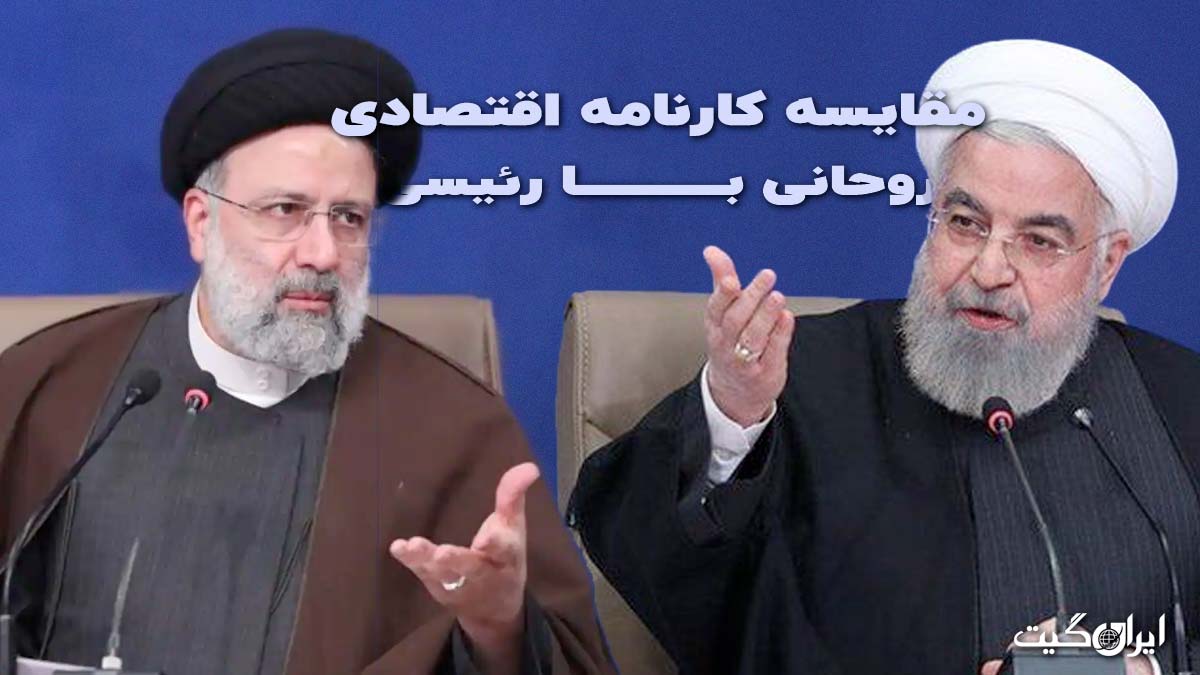Comparing Rouhani’s Economic Performance with Raisi
Over the past approximately 20 months, the government of Ebrahim Raisi has consistently emphasized its success in improving economic factors and the living conditions of the people. The thirteenth cabinet also repeatedly echoes this claim, citing some statistics and figures announced by government institutions. One of the most important claims of the thirteenth government is success in controlling inflation, which has faced strong reactions from economists and experts. On the other hand, members of Raisi’s cabinet have consistently attacked the Rouhani government, attributing the dire living conditions to the poor performance of the twelfth and eleventh governments. But is this claim true?
In order to assess this claim by the government of Ebrahim Raisi, we intend to compare various economic indicators between the twelfth and thirteenth governments. For this purpose, a three-part dossier has been prepared, in which the first part examines the most important factor in assessing the country’s economic conditions, namely the inflation rate.
Who is responsible for the 50% inflation?
Economists generally believe that the monetary and banking policies of any country can either exacerbate or alleviate inflation. The Iranian economy, despite its deep structural differences from global patterns, is not exempt from this rule. In other words, it can be said that the control or intensification of inflation does not stem from individual-centric policies, but rather depends on the actions and policies of the central bank and ultimately the government.
For over 20 years, Ibrahim Raisi has been involved in various roles and is responsible for the policies adopted in various fields, along with his chosen cabinet. The central bank, which has been completely obedient to the Ministry of Economy and the President’s orders, cannot therefore justify the current 50% inflation rate or absolve the previous government of responsibility.
Of course, the Rouhani government also faced similar conditions, and despite significant differences from the Raisi government, the responsibility for the high 30% inflation rate lies with the members of the cabinet and the twelfth presidency. In other words, inflation is not an inheritance that governments pass on to each other, but rather a result of the incorrect policies of governments that lead to an intensification and a sudden jump in the inflation rate by over 20% in just 20 months.
By the way, let’s test the claim of inflation control in the Raisi government.
As mentioned before, since taking office, the Ibrahim Raisi government has consistently emphasized controlling inflation in the 13th administration. We have repeatedly heard statements from Ibrahim Raisi and other cabinet members about controlling the inflation rate by around 16 percent. But does this claim hold true? Has Raisi’s economic team actually reduced inflation by 16 percent compared to what they inherited?
Field observations and statements from economists have repeatedly refuted such claims. However, to examine this claim, we need to refer to the reports of the Statistical Center of Iran. It is not possible to draw conclusions based solely on observations. According to the data published by the Statistical Center of Iran, the annual inflation rate was around 39 percent when Hassan Rouhani handed over the government to Ibrahim Raisi. Currently, this economic indicator has been announced to be over 46 percent for the month of Dey 1401 (December 2022).
But even on the best days when Raisi’s team was in charge, the annual inflation rate has been fluctuating around 38 percent. This means that even if we consider the lowest inflation rate during the 20 months of President Seyyed Ibrahim Raisi’s term as the benchmark for comparison, there is only a one percent decrease compared to the last month of Rouhani’s government.
However, President Raisi and members of the thirteenth cabinet strangely and unusually refer to a report that was published by the Central Bank on their orders and compare it to the report of the Statistical Center, which has a completely different calculation method from the Central Bank. According to this report, which was published during the presidency of Ali Salehabadi, the inflation rate in Rouhani’s government was over 60%, while the Raisi government has managed to contain it to 16%.
But the point here is that the economic team of the thirteenth government makes a claim about the inflation rate without mentioning the calculation differences between the two models of the Statistical Center of Iran and the Central Bank, which has no basis in reality.
A look at Raisi’s record in controlling inflation
By looking at the record of the Ibrahim Raisi government in the past 20 months and based on the reports of the Statistical Center of Iran, the average inflation rate in the past 20 months is calculated to be over 45%, while the average inflation rate in the twelfth government was recorded at around 38%.
In fact, it can be said that Hassan Rouhani’s government, at the height of the sanctions after the US withdrawal from the JCPOA, was able to manage the economy amidst a 7% inflation rate, which was the average inflation rate during the previous administration. In other words, the pace of devaluation of the Iranian rial during the twelfth government’s peak crisis of JCPOA violation by Trump was 7 percentage points lower than the current conditions.
However, Ibrahim Raisi and his chosen cabinet have intensified the inflation rate by more than 7 percentage points, despite the fact that the opportunity to revive the JCPOA was fully available and the government could have taken logical steps in this regard. It should be noted that all these figures and statistics are extracted from reports by the Iranian Statistical Center and are not from unofficial sources. Although economists believe that the official inflation rate announced by the Statistical Center is much lower than the actual inflation rate in the country, this report is based solely on the official statistics published by the twelfth and thirteenth governments.


